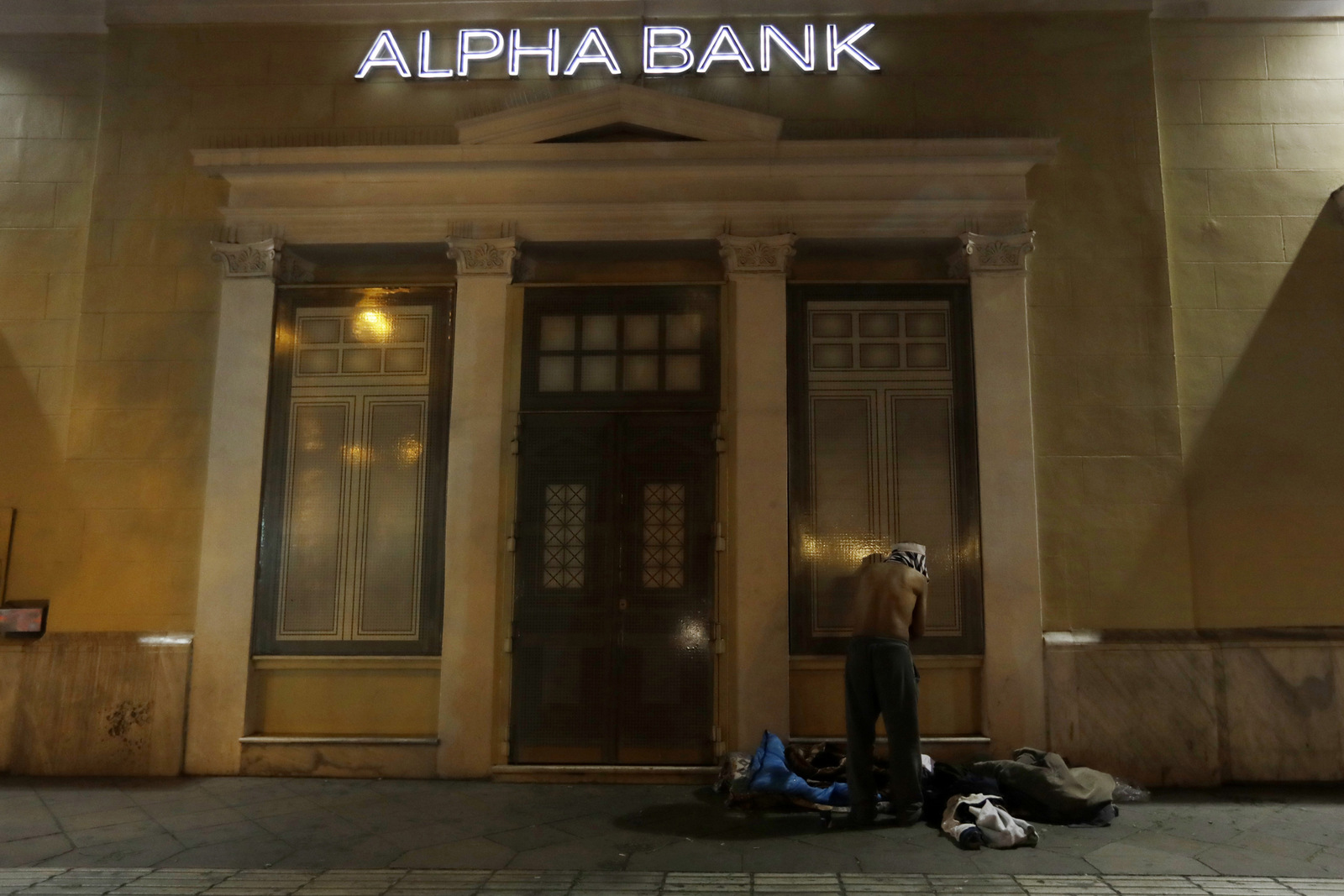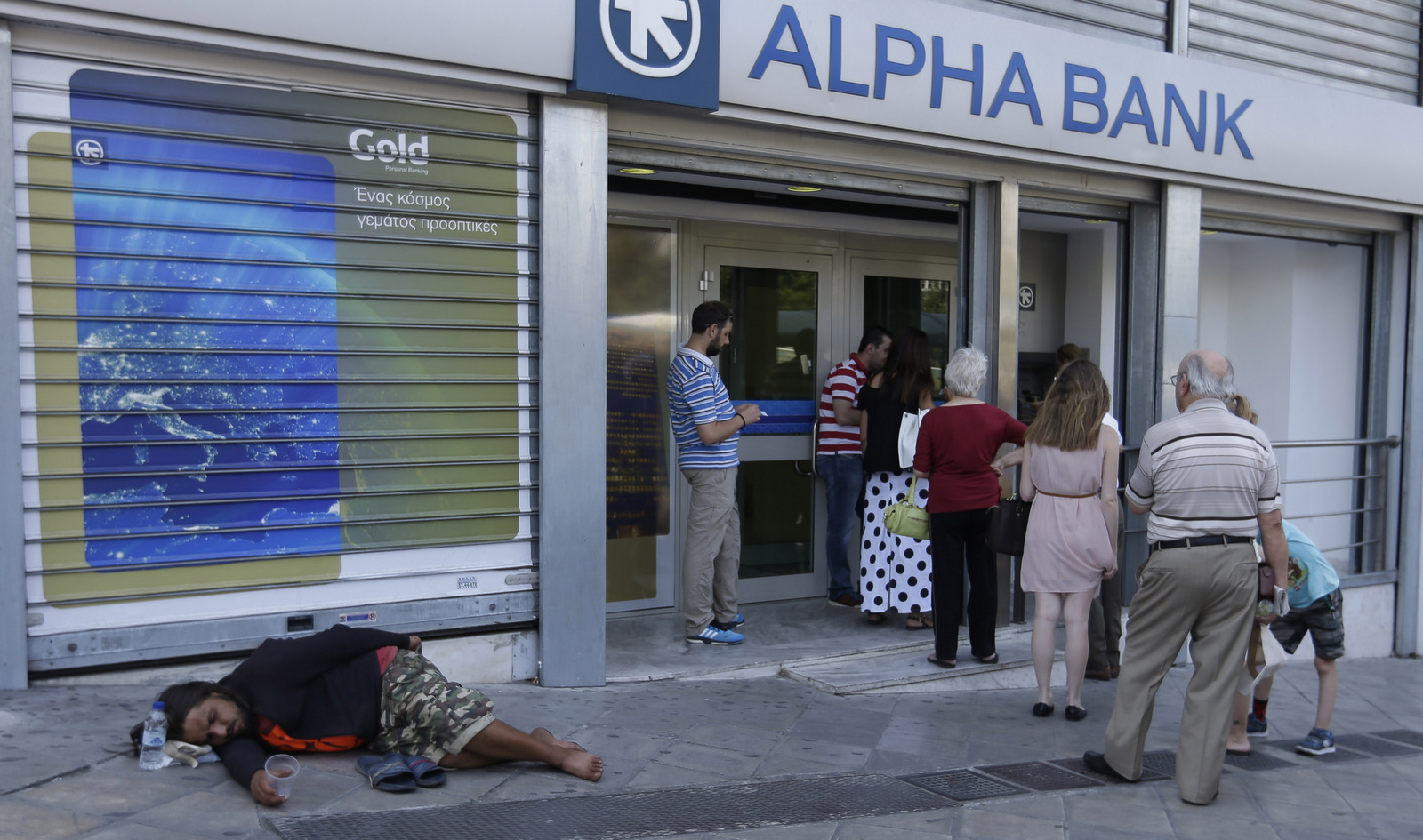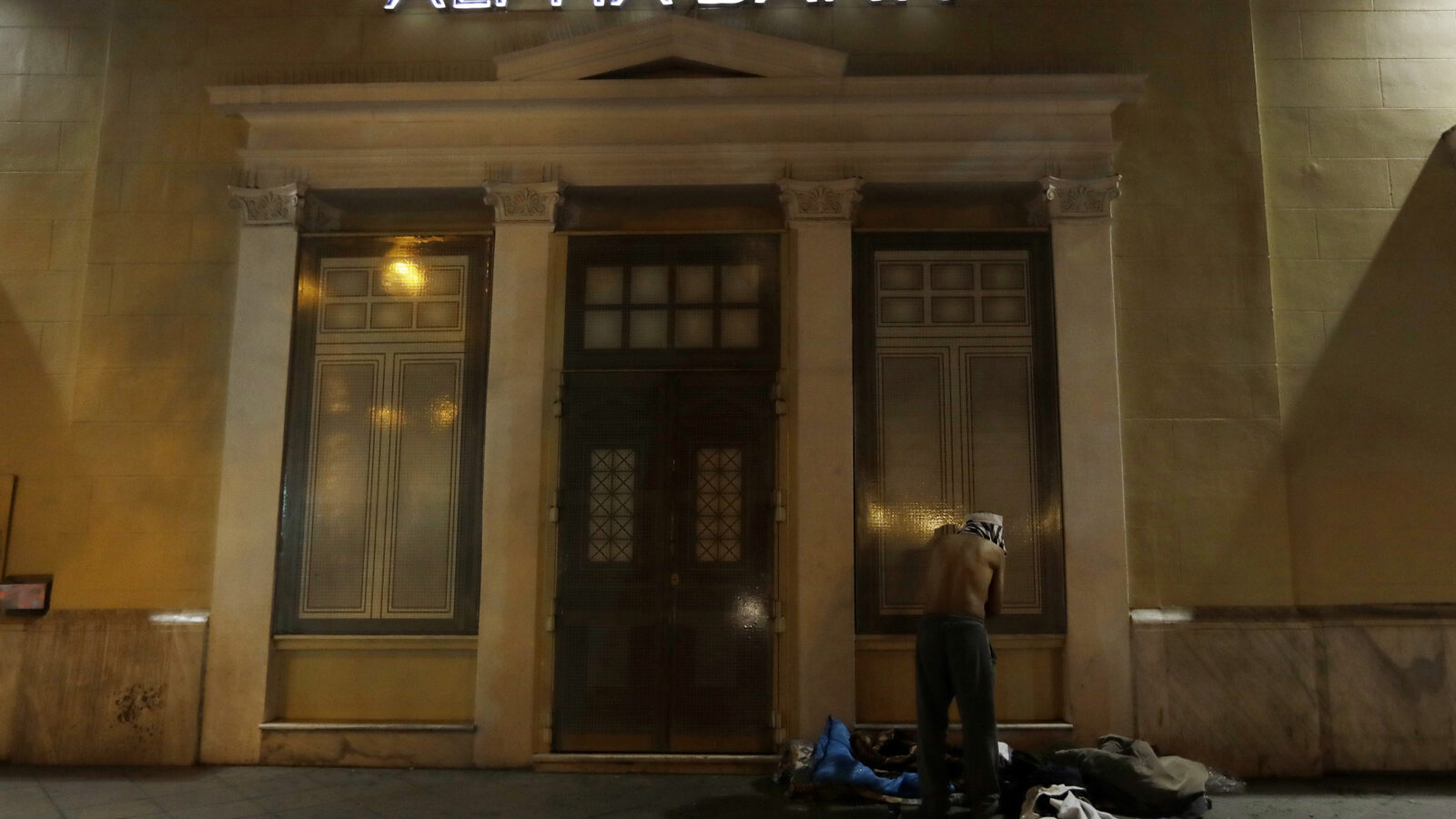
ATHENS (Analysis)– It has become an increasingly common sight on Greek streets, even in formerly prosperous neighborhoods. Elderly—and sometimes not so elderly—individuals rummaging through rubbish bins in search of scraps of food to eat. Beggars are now practically a universal sighting in Athens and other large cities.
More and more young Greeks are migrating abroad by the day, contributing to a “brain drain” that has totaled approximately 500,000 individuals since the onset of the crisis. In my neighborhood in central Athens, several parked cars are filled to the brim with a life’s worth of possessions, packed in boxes by individuals who have likely lost their homes and livelihoods and who now call their automobiles home. Everywhere, abandoned cars and motorcycles rust away on curbsides and sidewalks.
In another universe, the Greek coalition government comprised of the “leftist” SYRIZA and the “patriotic” Independent Greeks political parties is celebrating. Greece has, at the recently-concluded Eurogroup summit, once again been “saved.” In this latest agreement, an 8.6 billion euro tranche of “bailout” funds—a loan (not a “handout”) which had already been promised to Greece in previous agreements—was released and a long-delayed review of Greece’s “progress” under the austerity mechanisms was finally completed. Quite a cause for celebration!
Or is it? Out of the 8.6 billion, 7.7 billion euros will initially be disbursed, out of which 6.9 billion will be immediately paid back to Greece’s lenders: the European Central Bank, the International Monetary Fund and bondholders. In exchange for the release of these funds, which will be funneled right back to those who are releasing them, Greece’s government has agreed to achieve a primary budget surplus of 3.5 percent of its GDP annually through 2023, and thereafter to maintain primary budget surpluses of 2 percent annually from 2023 until 2060.
Until 2023, the Greek government has agreed to pay 27 billion euros (15 percent of Greece’s GDP) in debt service alone, and that figure increases to a 36 billion euro annual sum until 2060.
Related: Greece’s New Deal From European Lenders Delivers More Neoliberalism
For the uninitiated: what does a primary budget surplus actually mean? It means that the state spends less than it receives in revenue. While this may sound like a fiscally prudent policy direction for Greece or any country to take, what this actually means in plain language is that in an economy that is shrinking, as with Greece, the amount of money being spent by the state each year on investment, social services, salaries, pensions and other vital services will perpetually decrease, furthering the austerity death spiral.
To provide some perspective, the IMF itself considers a primary budget surplus of 1.5 percent “realistic,” while the Central Bank of Greece, 92 percent of whose shareholders are not known, considers 2 percent a “realistic” target. In a study by economists Barry Eichengreen and Ugo Panizza that examined economic performance across 235 countries, it was found that there were only 36 cases in which countries were able to maintain a primary budget surplus of 3 percent of GDP for a five-year period, and only 17 cases where countries maintained a primary budget surplus of 3 percent of GDP across an eight-year period. Germany, often touted for its fiscal prudence, was not one of these countries.
For the SYRIZA-led regime in Greece, this is a cause for celebration. Prime Minister Alexis Tsipras publicly announced that “we got what we wanted” through this deal, which points the way towards Greece’s exit from the “supervision” of its lenders.
The newspaper Avgi, an official party organ of SYRIZA, announced for the upteenth time Greece’s impending “exit” from the economic crisis. And the Greek government is publicly touting the upcoming return of Greece to the international financial markets, ironically celebrating the prospect of Greece once again being able to attain more debt via borrowing, likely at usurious terms.
Unfortunately for Tsipras and his government, German Finance Minister Wolfgang Schäuble acted as a party pooper, putting a damper on the celebrations. Speaking publicly after the Eurogroup deal was reached, Schäuble stated that the agreement, which followed what were claimed by the Greek government to be fierce negotiations, was reached three weeks prior but was delayed because the Greek government requested additional time for PR reasons—in other words, to claim that hard negotiations took place.
Pensions, salaries see cuts as austerity steamrolls ahead
Indeed, if the rhetoric of the SYRIZA-led government is a guide to go by, then the successes have kept on coming. In February, the SYRIZA government reached yet another deal with its lenders to once again release “bailout” loan funds that already had been pledged to Greece from previous austerity agreements.
In this agreement, the government claimed that “not one euro” of new austerity would be enacted, as any austerity measures and cuts (including interventions to the tax system, which were previously claimed by the government to be “red lines” in its “negotiations” with lenders) would be offset by countermeasures in other areas, euphemistically referred to as “neutral fiscal balance” and “zero-sum fiscal interventions.”
In a “read my lips, no new taxes” moment for the Greek government, these declarations of “zero-sum fiscal interventions” and the “end of austerity” had only just barely been uttered when a host of new austerity measures were unveiled. Initially announced at 3.6 billion euros, these austerity measures now total 14.2 billion euros’ worth of cuts.
These include further reductions of 18 percent to already battered pensions, as well as salary cuts, tax increases, a cut in health expenditures, a further reduction of 50 percent to heating oil subsidies (in a country where the majority of households already cannot afford heating oil and have reverted to fireplaces and makeshift furnaces to keep warm), a reduced tax-free threshold and an increase in tax contributions, and the freeing up of home foreclosures and auctions.

In exchange, “countermeasures” that will be enacted in 2019 will only take place if Greece meets “fiscal targets” up until then, include minor tax cuts (such as a 70-euro reduction to the “unified property tax” which SYRIZA, prior to ascending to power, denounced as “unconstitutional”) and offering school lunches.
The Greek government, along with its bosses in Brussels and Berlin, continue to insist that tax increases will help, despite all economic evidence to the contrary. While revenues from the value-added tax (VAT) were at 16.3 billion euros when the VAT rate was at 19 percent, those revenues declined to 14.4 billion euros when the VAT was increased to 21 percent, and dropped further to 13.7 billion euros when the VAT was increased again to 23 percent. Today, the VAT for most goods and services is at 24 percent amidst an economic depression that has shown no real signs of abating.
While the SYRIZA-led government is congratulating itself for putting an end to austerity, the aforementioned unified property tax, which according to SYRIZA’s pre-election rhetoric was unconstitutional and to be abolished, will remain in effect at least until 2031. One year ago, in June 2016, a 7,500-page omnibus bill ratified by the Greek government without any debate transferred ownership of all of Greece’s public assets (ranging from water utilities to prime beachfront parcels of land) to a fund controlled by the European Stability Mechanism for the next 99 years.
Related: Greece Forced To Sell Public Water Utilities Under EU-Imposed Privatization Plan
The same bill also reduced the parliament to playing a rubber-stamp role, as it annulled the ability of the Greek parliament to formulate a national budget or to pass tax legislation, with automatic cuts to be activated if fiscal targets agreed upon with the country’s lenders are not met. Foreign experts working on the implementation of the austerity measures and privatizations in Greece were also, as of 2016, granted immunity from prosecution. If all of this seems exaggerated or far-fetched, consider a recent remark by the European Commissioner for Economic and Financial Affairs, Taxation and Customs Pierre Moscovici, who stated that “[The EU] often decide[s] Greece’s fate, in place of the Greeks.”
Move toward cashlessness benefiting “too big to fail” institutions
As all of this is taking place, Greek businesses—particularly small businesses—are being burdened further, required as of July 27 to install “point of sale” (POS) card readers and to accept payments via credit, debit or prepaid cards. Another law, which came into effect on January 1, pushes consumers towards card payments by setting a minimum threshold of spending at least 10 percent of one’s income via card in order to attain a somewhat higher tax-free threshold.
In a country where capital controls restricting withdrawals from bank accounts and ATMs have been in effect since June 2015, cash is being further withdrawn from the marketplace and is being delivered to a banking system that has already been recapitalized three times and is likely on its way towards a fourth taxpayer-funded “bailout,” keeping with the fine tradition of financial institutions that are said to be “too big to fail.” We are told, of course, that this is for society’s own good, in order to combat “tax evasion” and other terrible things.
Related: How Greece Became A Guinea Pig For A Cashless And Controlled Society
As all of this has taken place, 14 profitable Greek regional airports of strategic and economic importance have been privatized—ironically by being sold to Fraport, itself owned by the German public sector. The port of Piraeus, one of the largest in Europe, has been completely privatized; sold for a pittance to Chinese-owned Cosco. Greek water and power utilities, having been transferred to the aforementioned fund controlled by the ESM, are among the next assets slated for privatization.
Foreclosures of homes are slated to be expanded to primary residences, leaving many households at risk of ending up on the streets, while come September, foreclosures are slated to take place electronically, in accordance with the Greek government’s agreements with its lenders. It should be noted that foreclosure auctions that take place in Greek civil courts each Wednesday have become one of the few remaining battlegrounds where citizens are actively, and often quite successfully, pushing back against one of the products of the economic crisis, preventing many foreclosures from occurring. Switching to electronic foreclosures would eliminate this “inconvenience.”

Other “inconveniences” are also being done away with in swift fashion. In August 2016, police in the city of Katerini arrested a father of three for selling doughnuts without a license, fining him 5,000 euros for the offense. In another case, a vendor selling roasted chestnuts in the city of Thessaloniki was surrounded by 15 police officers and arrested for the high offense of operating without a license. In the meantime, Greek television and radio stations—almost the entirety of which are vehemently pro-EU and pro-austerity and which greatly impact public opinion—operate without valid broadcast licenses.
The SYRIZA government, elected in part on pledges to “nip oligarchs in the bud” (including taking care of the issue of unlicensed broadcasters), has instead allowed oligarchs to shift their money to offshore tax havens, while collectively treating ordinary citizens and small business owners as being guilty of tax evasion. Former finance minister with the center-right New Democracy political party Gikas Hardouvelis was recently acquitted in court for failure to submit a declaration of assets.
In a December 2015 interview, Finance Minister Euclid Tsakalotos stated that the SYRIZA-led government “didn’t have time to go after the rich.” Unlicensed chestnut vendors, apparently, are another matter altogether, as are activists against the environmentally destructive and economically dubious gold mining operations in north Greece’s Skouries that are being conducted by Eldorado Gold with a Greek oligarch, Giorgos Bobolas.
In late May, the physically disabled 77-year-old Thodoros Karavasilikos was issued a 12-month suspended jail sentence for, apparently, physically assaulting 10 riot police officers in a protest against the Skouries mining operations. Furthering this war on the elderly, Dimitris Kammenos, a member of parliament with the “patriotic” Independent Greeks party which is co-governing with SYRIZA, stated in a televised interview in April that 100 euros that were being slashed from pensions were “better off being taken by the state” than to be “given by pensioners to their grandchildren to go out and have coffee.”
Civil unrest on the rise amid economic uncertainty
It can be argued that being a Greek citizen is a great disadvantage in Greece at the present time. In the blighted Athens suburb of Menidi, an 11-year-old Greek child was apparently killed by a stray bullet, said to have been fired from a residence of a Roma family. Civil unrest has followed in the area between the Greek and Roma populations, to which the SYRIZA-led government has somehow responded by proposing that Roma children be allowed to enter Greek universities and the police academy without taking entrance exams.

While migrants in Greece are receiving 400euro monthly subsidies (greater than many salaries and pensions in present-day Greece) and free housing, thanks to assistance from the EU and numerous “well-meaning” non-governmental organizations, the same sensitivity has not been displayed to victims of a recent earthquake that severely impacted the island of Lesvos, one of the primary entry points for migrants. Instead, Kyriakos Mitsotakis, the leader of the center-right New Democracy, the main opposition party in Greece which is favored to win the next national elections whenever they take place, promised those whose homes were destroyed by the quake a two-year waiver of the unified property tax, should his party be elected.
Tourism, however, is said to be saving the day. Greece is said to be receiving record numbers of visitors, and the Eleftherios Venizelos International Airport in Athens is receiving a record number of passengers. These statistics are often repeated by the government and by Tourism Minister Elena Kountoura of the Independent Greeks political party, the minority partner in Greece’s coalition government. What is not said is who these tourists are, or what their real impact on the economy is.
Many of these tourists are visiting the country on package travel deals booked with overseas travel agencies, flying to and from Greece on foreign-owned charter airlines and staying in hotels which themselves are often owned by foreigners. Many of these hotels offer “all-inclusive” hospitality packages, often offering the very lowest-quality imported food and drink products in order to slash costs. While foreigners get to enjoy Greek resorts and sunshine at bargain rates, austerity-hit Greeks, battered by the crisis, cannot afford to—nor are they offered the same low rates provided to foreign visitors.
Most tourists on “all-inclusive” deals rarely venture away from their hotels, and businesses in tourist regions, ranging from convenience stores to restaurants, are seeing business suffer while their tax burden continues to increase. In a recent visit to Rhodes, one of Greece’s pre-eminent tourist destinations, I observed that the Old Town of Rhodes, perhaps the top tourist destination on the island, was almost deserted at 10:30 p.m. on a Friday night in a country that “stays up all night.” Tourists remained largely locked away in their all-inclusive resorts.
Greece’s “boom times” for tourism are evident by the country’s lack of a national air carrier, which has been the case ever since the previously state-owned Olympic Airlines was dismantled at the behest of the EU and purportedly for violating the European Commission’s competition rules. The privately-owned near-monopoly that has replaced it, Aegean Airlines, has somehow managed not to run afoul of such rules.
While Greece, one of Europe’s top destinations, does not possess any wide-body aircraft, countries such as Serbia and Rwanda do and are running nonstop flights to the United States. Aegean Airlines may not have long-haul flights, but it has delivered much-vaunted “foreign investment”—often touted as the cure-all for Greece’s economic ills, despite a major privatization push since the 1990s, which did not stop the crisis—as 25 percent of the airline is reportedly being purchased by Hainan Airlines of China.
Tourism Minister Elena Kountoura, apropos of nothing, recently brought us back to 2015 and to the referendum which took place that year, where 62 percent of voters rejected an EU-proposed austerity plan—only for the result to be overturned within days, as the SYRIZA-led government turned around and agreed to an even harsher austerity package, known as the third memorandum agreement, than the one voters had rejected.
The SYRIZA-led government has since agreed to a fourth memorandum agreement, but according to Kountoura, the negotiation that occurred in 2015 that led to the third memorandum—chock-full of austerity measures and the privatization of profitable assets—prevented 16 billion euros’ worth of austerity measures from being enacted.
No end in sight for bleak austerity
Unfortunately, two years after the “triumphant” referendum and rejection of austerity—which was promptly overturned and replaced with even harsher austerity—there seems to be no light at the end of the tunnel for the beleaguered nation. Nor does a political “savior” appear to exist. The aforementioned New Democracy party is part and parcel of the corrupt political duopoly, along with PASOK, which ruled Greece for 40 years after the fall of the military junta in 1974, and is vehemently pro-EU and pro-austerity (as long as they are the ones implementing the austerity and pro-Europe policies, instead of SYRIZA).
In previous elections, political “renegade” Vasilis Leventis and his Centrists’ Union political party were elected to parliament—likely as a protest vote. Leventis is famous for his supposed crusades against corruption and the two-party system, and for wishing cancer upon former Prime Ministers Kostantinos Mitsotakis (father of the current New Democracy leader) and Andreas Papandreou (father of George Papandreou, prime minister when Greece was led into the IMF-EU “bailout” and austerity regime) on live television in 1993.

Today, Leventis is calling for the installation of a “government of technocrats” (much like the non-elected government led by banker Loucas Papademos in late 2011 and 2012, which passed the second memorandum agreement with no popular mandate) and who has also stated recently that Greece “does not deserve to have its debt restructured.”
In reality, the entirety of parliament—despite the eight political parties which comprise it and which create the facade of political pluralism—can be described as being pro-austerity, pro-euro, and pro-EU. The same can be said of smaller political parties, currently outside of parliament and vying to gain public support.
These include parties founded by Panagiotis Lafazanis and Zoe Konstantopoulou—who as part of the first SYRIZA government of January-September 2015 voted in favor of numerous pro-memorandum and pro-austerity pieces of legislation and in favor of the pro-Europe corrupt former government minister Prokopis Pavlopoulos as president of the Hellenic Republic, who recently stated that Greece will remain in the EU “indefinitely and irrevocably.”
Two years after saying “no” to austerity, this is the state of affairs in Greece today. Poverty, fear, unemployment and a continued brain drain, as well as corruption, lies, and above all, an undying attachment to the EU and the Eurozone, at least on the part of the almost complete entirety of the country’s political class. That’s life today in a modern-day EU debt colony.


